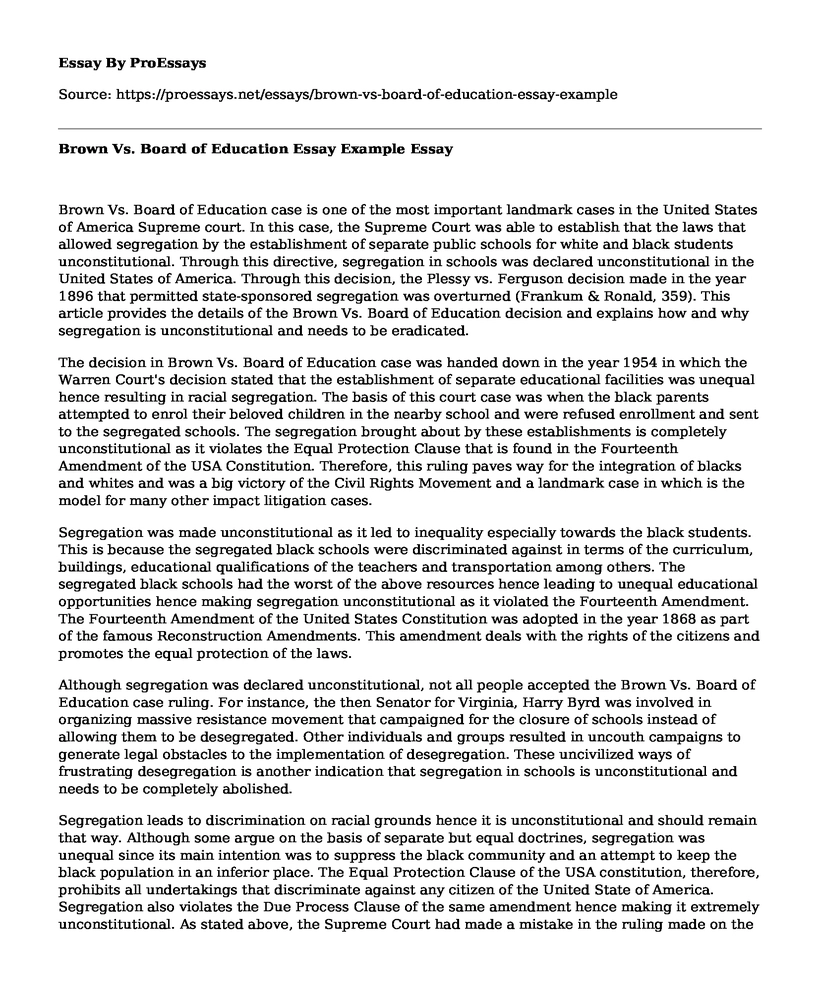Brown Vs. Board of Education case is one of the most important landmark cases in the United States of America Supreme court. In this case, the Supreme Court was able to establish that the laws that allowed segregation by the establishment of separate public schools for white and black students unconstitutional. Through this directive, segregation in schools was declared unconstitutional in the United States of America. Through this decision, the Plessy vs. Ferguson decision made in the year 1896 that permitted state-sponsored segregation was overturned (Frankum & Ronald, 359). This article provides the details of the Brown Vs. Board of Education decision and explains how and why segregation is unconstitutional and needs to be eradicated.
The decision in Brown Vs. Board of Education case was handed down in the year 1954 in which the Warren Court's decision stated that the establishment of separate educational facilities was unequal hence resulting in racial segregation. The basis of this court case was when the black parents attempted to enrol their beloved children in the nearby school and were refused enrollment and sent to the segregated schools. The segregation brought about by these establishments is completely unconstitutional as it violates the Equal Protection Clause that is found in the Fourteenth Amendment of the USA Constitution. Therefore, this ruling paves way for the integration of blacks and whites and was a big victory of the Civil Rights Movement and a landmark case in which is the model for many other impact litigation cases.
Segregation was made unconstitutional as it led to inequality especially towards the black students. This is because the segregated black schools were discriminated against in terms of the curriculum, buildings, educational qualifications of the teachers and transportation among others. The segregated black schools had the worst of the above resources hence leading to unequal educational opportunities hence making segregation unconstitutional as it violated the Fourteenth Amendment. The Fourteenth Amendment of the United States Constitution was adopted in the year 1868 as part of the famous Reconstruction Amendments. This amendment deals with the rights of the citizens and promotes the equal protection of the laws.
Although segregation was declared unconstitutional, not all people accepted the Brown Vs. Board of Education case ruling. For instance, the then Senator for Virginia, Harry Byrd was involved in organizing massive resistance movement that campaigned for the closure of schools instead of allowing them to be desegregated. Other individuals and groups resulted in uncouth campaigns to generate legal obstacles to the implementation of desegregation. These uncivilized ways of frustrating desegregation is another indication that segregation in schools is unconstitutional and needs to be completely abolished.
Segregation leads to discrimination on racial grounds hence it is unconstitutional and should remain that way. Although some argue on the basis of separate but equal doctrines, segregation was unequal since its main intention was to suppress the black community and an attempt to keep the black population in an inferior place. The Equal Protection Clause of the USA constitution, therefore, prohibits all undertakings that discriminate against any citizen of the United State of America. Segregation also violates the Due Process Clause of the same amendment hence making it extremely unconstitutional. As stated above, the Supreme Court had made a mistake in the ruling made on the Plessy vs. Ferguson case in which separate but equal was termed to be constitutional. The error was corrected through the ruling of the Brown vs. Board of Education case which termed segregation as unconstitutional.
Works Cited
Frankum Jr, Ronald B. "Brown v. Board of Education." The American Middle Class: An Economic Encyclopedia of Progress and Poverty [2 volumes] (2017): 359.
Cite this page
Brown Vs. Board of Education Essay Example. (2022, Oct 19). Retrieved from https://proessays.net/essays/brown-vs-board-of-education-essay-example
If you are the original author of this essay and no longer wish to have it published on the ProEssays website, please click below to request its removal:
- Paper Example on Jews and Civil Rights Movement
- The Impact of ADHD on Children's Academic Performance Essay
- Personal Essay for UHD MSCJ Program
- Toys and Gender Neutrality Essay Example
- William Rodriguez Case Study
- Essay on Government Structure: 3 Branches of Power & Responsibility
- Paper Example on Growth of US Security Industry: 2 Decades of Federal Legislation & Private Practices







